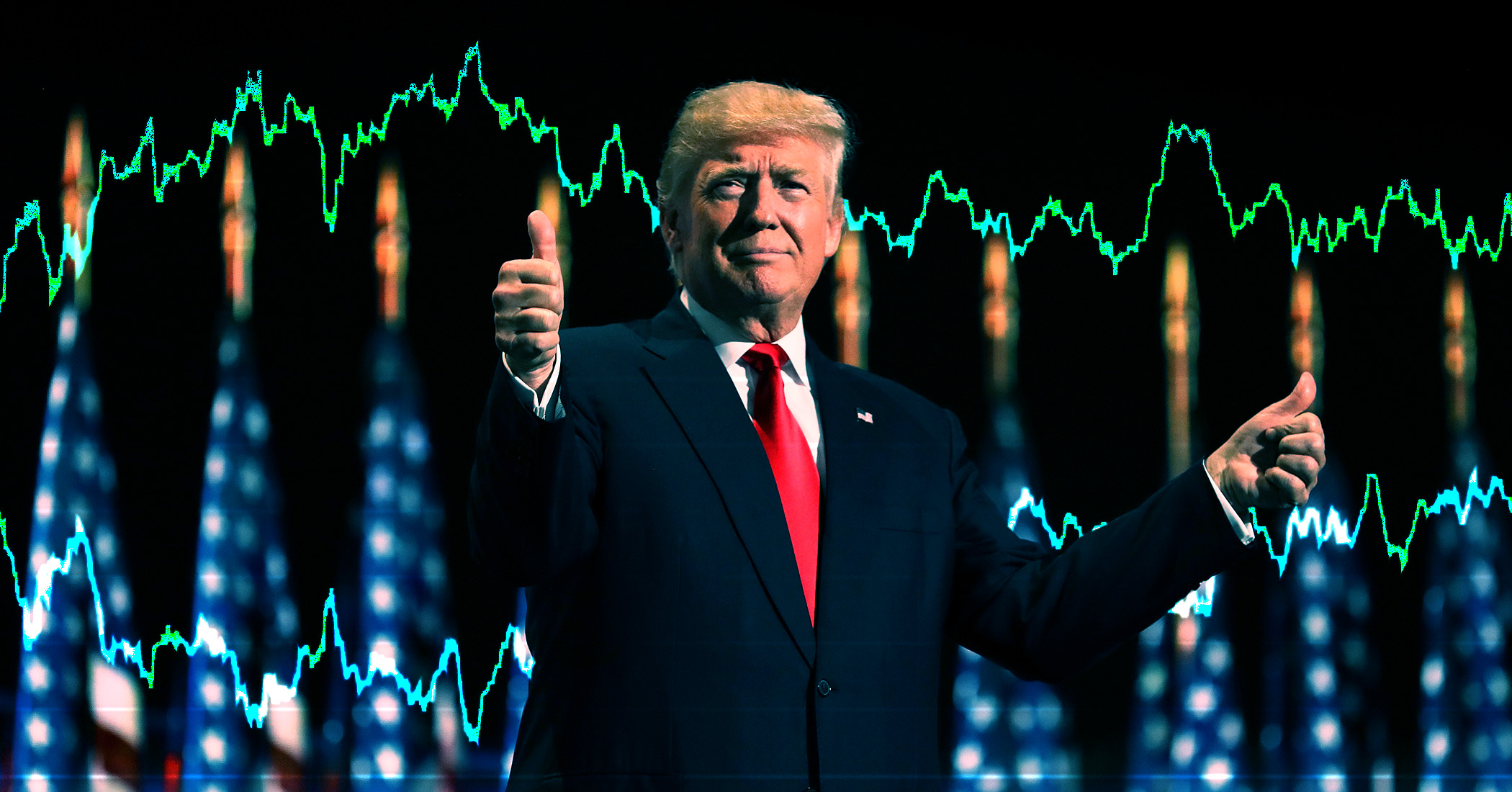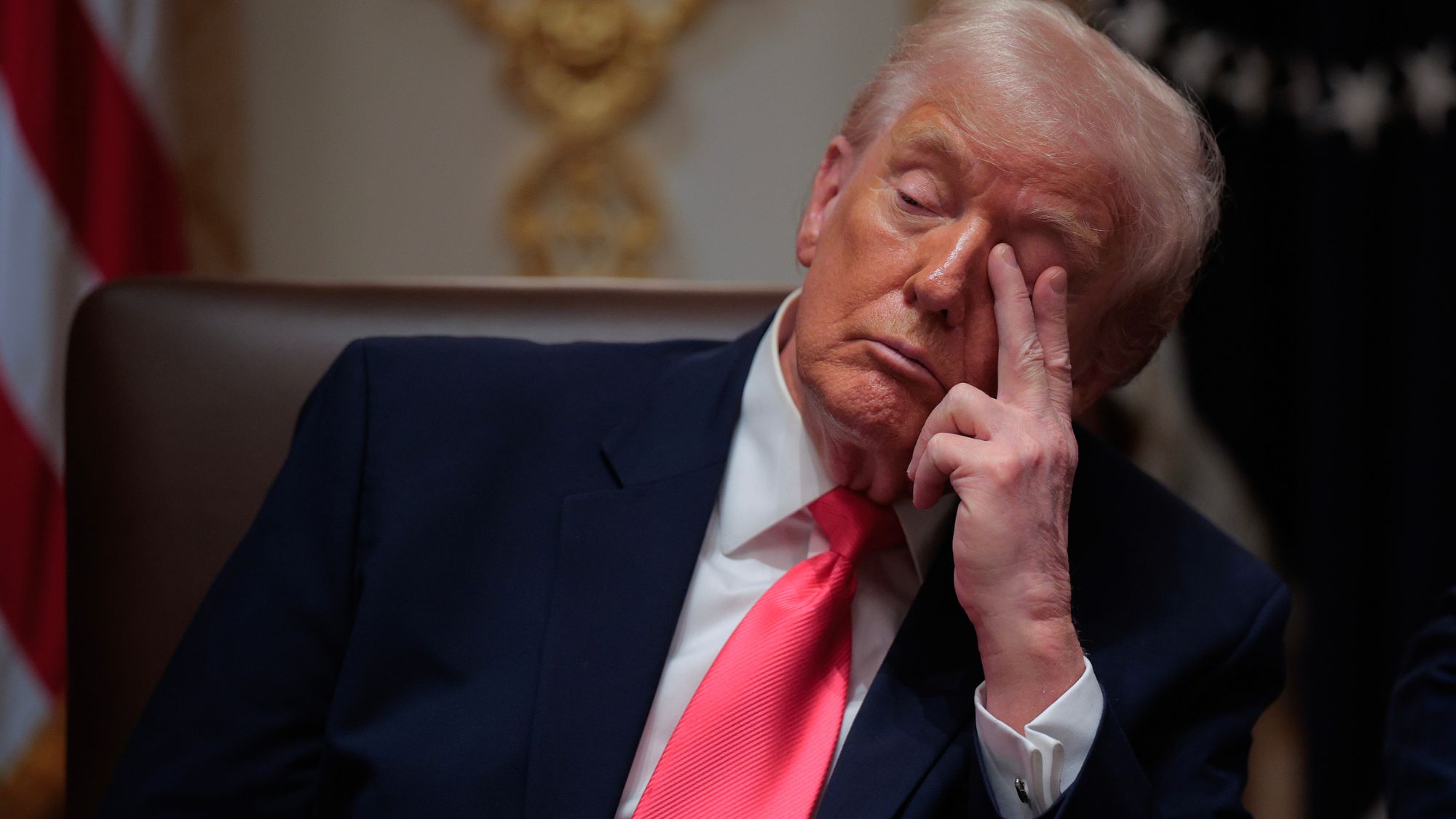The mystery of Trump's secret polling
Trump keeps boasting about his campaign's internal polling. Does he know something we don't?


A free daily email with the biggest news stories of the day – and the best features from TheWeek.com
You are now subscribed
Your newsletter sign-up was successful
In the week before the 2016 election, the pollsters were adamant Hillary Clinton had it in the bag. You remember what the final election forecasts were like: The New York Times said Clinton had a 92 percent chance of winning. HuffPost said 98 percent. FiveThirtyEight, comparatively cautious, gave her a mere 71 percent shot at victory. And I live in Minnesota, a state so blue it was the sole vote against re-electing President Ronald Reagan in 1984. Both locally and nationally, the matter seemed settled — until, of course, we had a President Trump.
With the 2020 race underway, that memory has me duly skittish about polls. It also has me deeply curious about the internal polling data the Trump campaign is using. "Nervous Nancy Pelosi is doing everything possible to destroy the Republican Party," the president tweeted Tuesday. "Our Polls show that it is going to be just the opposite. The Do Nothing Dems will lose many seats in 2020." This could be bluster or wishful thinking; Trump is not above describing reality as he'd like it to be. But after 2016, suffice it to say I'd like to see the numbers he's seeing.
Tuesday was not the first time Trump has claimed to have internal polling predicting a strong showing for himself or his party in the coming election. "One of the greatest and most powerful weapons used by the Fake and Corrupt News Media is the phony Polling Information they put out," he wrote in September. "Many of these polls are fixed, or worked in such a way that a certain candidate will look good or bad. Internal polling looks great, the best ever!" Tweets in August and June were similarly explicit declarations about private campaign data, and the falsity of media polls more generally is always a favorite theme.
The Week
Escape your echo chamber. Get the facts behind the news, plus analysis from multiple perspectives.

Sign up for The Week's Free Newsletters
From our morning news briefing to a weekly Good News Newsletter, get the best of The Week delivered directly to your inbox.
From our morning news briefing to a weekly Good News Newsletter, get the best of The Week delivered directly to your inbox.
The fact that Trump has never shared specific internal numbers militates against the possibility that he's telling the truth. The president has tweeted classified imagery before and otherwise made public information that usually would not be revealed. If he is unbothered by federal classification guidelines, surely he wouldn't hesitate to post flattering campaign info. If "Our Polls" were truly that fantastic, wouldn't Trump post a screenshot?
Yet we also have the evidence of Trump's campaign rally locations to consider. Again, Minnesota is a Democratic stronghold and has been for decades. The bulk of the population is here in the Twin Cities, where in local races the general election line-up looks like a Democratic primary. But Trump keeps visiting. He came to Duluth in June of last year, to Rochester last October, and to Minneapolis itself a few weeks ago.
This is noteworthy because, as a Rolling Stone report on the Duluth rally noted, "Trump does not tend to visit states he cannot in some way claim as his." Moreover, if he's following the 2016 script — lots of rallies and targeted online advertising in states deemed winnable, but little in the way of traditional, in-person ground game — these events shed important light on Trump's 2020 strategy. There are other plausible explanations for the president's Minnesota trips, like that one of his favorite Democratic punching bags, Rep. Ilhan Omar, represents Minneapolis. Still, that can't explain the rallies in Duluth and Rochester. What can explain them is the Trump campaign sincerely thinking Minnesota is in play.
A Politico report from August suggests turning Minnesota red in 2020 is a fixation for Trump, who considers it the Midwest state "that got away in 2016." The data available to the public suggests a flip is improbable. Granted, Trump lost Minnesota in 2016 by a fairly small margin (1.5 percent), and he did win plenty of longtime Democratic counties.
A free daily email with the biggest news stories of the day – and the best features from TheWeek.com
But at the state-wide level, the closeness of the 2016 race was more about Democratic voters backing third-party candidates than Trump attracting more support than Republican nominee Mitt Romney did in 2012. It was less his near-win than Clinton's near-loss, which means a stronger (and Midwest-attentive) Democratic nominee in 2020 could probably count Minnesota safe. The 2018 midterms offered a foretaste here: Democrats swept the GOP-friendly suburbs of the Twin Cities to handily retake the lower house of the state legislature. More recently, a local poll asking Minnesotans to pick between Trump and four Democratic primary candidates saw the president consistently getting trounced with margins of 9 to 17 percent.
All that evidence doesn't seem to have deterred Trump, which brings me back to these allegedly glorious internal polls. What does the Trump campaign's data say about Minnesota?
And, for that matter, what does it say about some of the other post-2016 Trump rally sites? Like New Mexico, which went for Clinton in 2016 by 8 percent. Or New Hampshire or Nevada — both, like Minnesota, narrow Clinton wins with a sizeable third-party vote — now reporting extreme presidential disapproval. Or what about key Trump 2016 victory states like Wisconsin, Michigan, Ohio, and Pennsylvania, all of which have since moved to net disapproval of Trump?
The map looks bad for Trump now, but ahead of Election Day 2016, Clinton was leading in most of the Midwestern and Rust Belt states where Trump rallied and won. Does he have good cause to think that dynamic will play out again? Because he's still visiting, and Trump typically only visits places he believes he can win.
Maybe his poll boasts are just that. But I'd sure like to get a look at those numbers.
Want more essential commentary and analysis like this delivered straight to your inbox? Sign up for The Week's "Today's best articles" newsletter here.
Bonnie Kristian was a deputy editor and acting editor-in-chief of TheWeek.com. She is a columnist at Christianity Today and author of Untrustworthy: The Knowledge Crisis Breaking Our Brains, Polluting Our Politics, and Corrupting Christian Community (forthcoming 2022) and A Flexible Faith: Rethinking What It Means to Follow Jesus Today (2018). Her writing has also appeared at Time Magazine, CNN, USA Today, Newsweek, the Los Angeles Times, and The American Conservative, among other outlets.
-
 The 8 best TV shows of the 1960s
The 8 best TV shows of the 1960sThe standout shows of this decade take viewers from outer space to the Wild West
-
 Microdramas are booming
Microdramas are boomingUnder the radar Scroll to watch a whole movie
-
 The Olympic timekeepers keeping the Games on track
The Olympic timekeepers keeping the Games on trackUnder the Radar Swiss watchmaking giant Omega has been at the finish line of every Olympic Games for nearly 100 years
-
 The billionaires’ wealth tax: a catastrophe for California?
The billionaires’ wealth tax: a catastrophe for California?Talking Point Peter Thiel and Larry Page preparing to change state residency
-
 Bari Weiss’ ‘60 Minutes’ scandal is about more than one report
Bari Weiss’ ‘60 Minutes’ scandal is about more than one reportIN THE SPOTLIGHT By blocking an approved segment on a controversial prison holding US deportees in El Salvador, the editor-in-chief of CBS News has become the main story
-
 Trump’s poll collapse: can he stop the slide?
Trump’s poll collapse: can he stop the slide?Talking Point President who promised to ease cost-of-living has found that US economic woes can’t be solved ‘via executive fiat’
-
 Has Zohran Mamdani shown the Democrats how to win again?
Has Zohran Mamdani shown the Democrats how to win again?Today’s Big Question New York City mayoral election touted as victory for left-wing populists but moderate centrist wins elsewhere present more complex path for Democratic Party
-
 Millions turn out for anti-Trump ‘No Kings’ rallies
Millions turn out for anti-Trump ‘No Kings’ ralliesSpeed Read An estimated 7 million people participated, 2 million more than at the first ‘No Kings’ protest in June
-
 Ghislaine Maxwell: angling for a Trump pardon
Ghislaine Maxwell: angling for a Trump pardonTalking Point Convicted sex trafficker's testimony could shed new light on president's links to Jeffrey Epstein
-
 The last words and final moments of 40 presidents
The last words and final moments of 40 presidentsThe Explainer Some are eloquent quotes worthy of the holders of the highest office in the nation, and others... aren't
-
 The JFK files: the truth at last?
The JFK files: the truth at last?In The Spotlight More than 64,000 previously classified documents relating the 1963 assassination of John F. Kennedy have been released by the Trump administration
